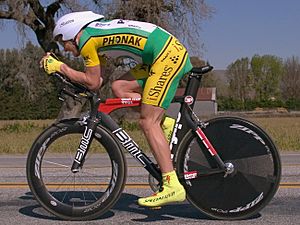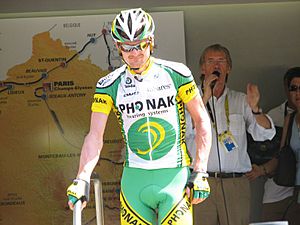Floyd Landis facts for kids

Landis in 2009
|
|||
| Personal information | |||
|---|---|---|---|
| Born | October 14, 1975 Farmersville, Pennsylvania, U.S. |
||
| Height | 1.78 m (5 ft 10 in) | ||
| Weight | 68 kg (150 lb) | ||
| Team information | |||
| Current team | Retired | ||
| Discipline | Road | ||
| Role | Rider | ||
| Rider type | All-rounder | ||
| Major wins | |||
|
|||
Floyd Landis (born October 14, 1975) is a retired American professional road racing cyclist. He was a talented all-around rider, skilled in climbing hills, racing against the clock in time trials, and descending mountains quickly.
In 2006, Landis crossed the finish line first in the famous Tour de France. However, he was later disqualified after tests showed he had used performance-enhancing drugs, which are against the rules of the sport. Because of this, the official winner of the 2006 Tour de France became Óscar Pereiro.
For years, Landis said he was innocent. But in 2010, he admitted to using banned substances. He also said that other famous cyclists, including his former teammate Lance Armstrong, had done the same. This led to a major investigation into the sport.
Contents
Early Life and Biking
Floyd Landis grew up in a religious Mennonite community in Farmersville, Pennsylvania. He was the oldest of six children. When he was 15, he bought his first mountain bike and started entering local races.
Because of his family's beliefs, he wore sweatpants instead of the usual cycling shorts. His father did not approve of his racing and gave him extra chores to keep him busy. To get time to train, Landis would often sneak out late at night, sometimes in freezing weather. His hard work paid off, and at 18, he won a national junior championship.
Cycling Career
From Mountain Bikes to Road Racing
Landis won the very first mountain bike race he ever entered. In 1993, he became the U.S. junior national champion. He told his friends that one day he would win the Tour de France. At age 20, he moved to Southern California to become a full-time mountain biker.
He soon switched to road cycling. His talent was noticed by Lance Armstrong, who asked him to join the U.S. Postal Service team in 2002. Landis became a key helper, or domestique, for Armstrong. His job was to help Armstrong win by setting a fast pace in the mountains. His strength was so impressive that some people thought he could one day lead a team and win the Tour himself. In 2005, he joined the Phonak team to get a chance to be a team leader.
Success and a Hidden Injury
The 2006 season started very well for Landis. He won major races like the Tour of California and Paris–Nice. He was one of the top cyclists in the world.
What made his performance even more amazing was a secret injury. Landis was suffering from osteonecrosis, a painful hip condition caused by an old crash. The bone in his hip was deteriorating, causing him constant pain. He said it felt like "bone rubbing on bone."
He kept the injury secret from almost everyone. During the 2006 Tour de France, he was given special permission to use cortisone, a pain medicine that is normally not allowed. Despite the pain, he rode incredibly well. After the Tour, he had surgery to replace his hip joint.
The 2006 Tour de France Controversy
After an amazing comeback in Stage 17 of the 2006 Tour de France, Landis was on his way to winning the entire race. But on July 27, 2006, his team announced that a drug test from that stage had come back positive. It showed a very high level of testosterone, a substance that can be used to improve performance.
Landis denied breaking any rules and said he would fight to prove his innocence. However, a second sample also tested positive. He was fired from his team and suspended from cycling. The International Cycling Union (UCI), the governing body of cycling, officially stripped him of his Tour de France title.
For the next few years, Landis fought the decision in court. He appealed to the United States Anti-Doping Agency (USADA) and later to the Court of Arbitration for Sport (CAS), but both organizations upheld the guilty verdict. His two-year ban from cycling was confirmed.
Return to Cycling and Admission
Landis returned to cycling in 2009 after his ban ended. He raced for smaller American teams but struggled to find a permanent spot. His professional career effectively ended in 2011 when he could not find a new team.
Then, on May 20, 2010, the story took a dramatic turn. After years of denials, Landis sent emails to cycling officials admitting that he had used performance-enhancing drugs for much of his career.
He also accused many other top American cyclists, including Lance Armstrong, George Hincapie, and Levi Leipheimer, of doing the same. He described how they used banned substances like EPO and had blood transfusions to boost their performance.
His admission sent shockwaves through the world of cycling. The World Anti-Doping Agency and the U.S. government launched a major investigation based on his claims.
After Cycling
Landis's accusations led to a federal lawsuit against Lance Armstrong. Because the U.S. Postal Service had sponsored their team, the government argued that Armstrong had defrauded the U.S. by using government money while breaking the rules. In 2018, the case was settled, and Armstrong agreed to pay the government $5 million. As the person who started the case, Landis received $1.1 million of the settlement money.
In 2015, a movie called The Program was released about Lance Armstrong's career, with actor Jesse Plemons playing Floyd Landis.
In 2018, Landis used money from the lawsuit settlement to start his own professional cycling team to support new riders. The team ran for one year.
Career Achievements
Major results
- 1998
- 1st
National Under–23 Mountain Bike Championships
- 5th Sea Otter Classic
- 1999
- 2nd Overall Cascade Cycling Classic
- 1st Stage 1
- 3rd Overall Tour de l'Avenir
- 5th Overall Tour de Beauce
- 2000
- 1st
 Overall Tour du Poitou-Charentes
Overall Tour du Poitou-Charentes
- 4th Overall Tour de l'Avenir
- 5th Overall Tour de Langkawi
- 1st Stage 1 (ITT)
- 9th Overall Redlands Classic
- 2002
- 2nd Overall Critérium du Dauphiné Libéré
- 5th Overall Circuit de la Sarthe
- 9th Eddy Merckx Grand Prix
- 2003
- 1st Stage 4 (TTT) Tour de France
- 2004
- 1st
 Overall Volta ao Algarve
Overall Volta ao Algarve
- 1st Stage 5
- 1st Stage 4 (TTT) Tour de France
- Vuelta a España
- 7th Overall Tour of the Basque Country
- 8th Overall Critérium International
- 2005
- 1st
 Overall Tour de Georgia
Overall Tour de Georgia
- 1st Stage 3 (ITT)
- 1st Stage 1 (TTT) Volta a Catalunya
- 2nd Eindhoven Team Time Trial
- 9th Overall Tour de France
- 2006
1st Overall Tour de France
Overall Tour de France1st Stage 17
- 1st
 Overall Paris–Nice
Overall Paris–Nice - 1st
 Overall Tour of California
Overall Tour of California
- 1st Stage 3 (ITT)
- 1st
 Overall Tour de Georgia
Overall Tour de Georgia
- 1st Stage 3 (ITT)
- 2010
- 2nd Tour of the Battenkill
- 4th Overall Tour of Southland
Grand Tour general classification results timeline
| Grand Tour | 2002 | 2003 | 2004 | 2005 | 2006 |
|---|---|---|---|---|---|
| — | — | — | — | — | |
| 61 | 77 | 23 | 9 | ||
| — | 76 | DNF | DNF | — |
| — | Did not compete |
|---|---|
| DNF | Did not finish |
| Voided result |
See also
 In Spanish: Floyd Landis para niños
In Spanish: Floyd Landis para niños
- List of doping cases in cycling
 | John T. Biggers |
 | Thomas Blackshear |
 | Mark Bradford |
 | Beverly Buchanan |



